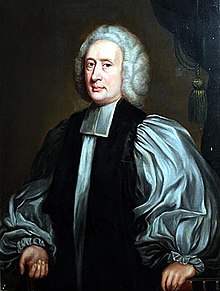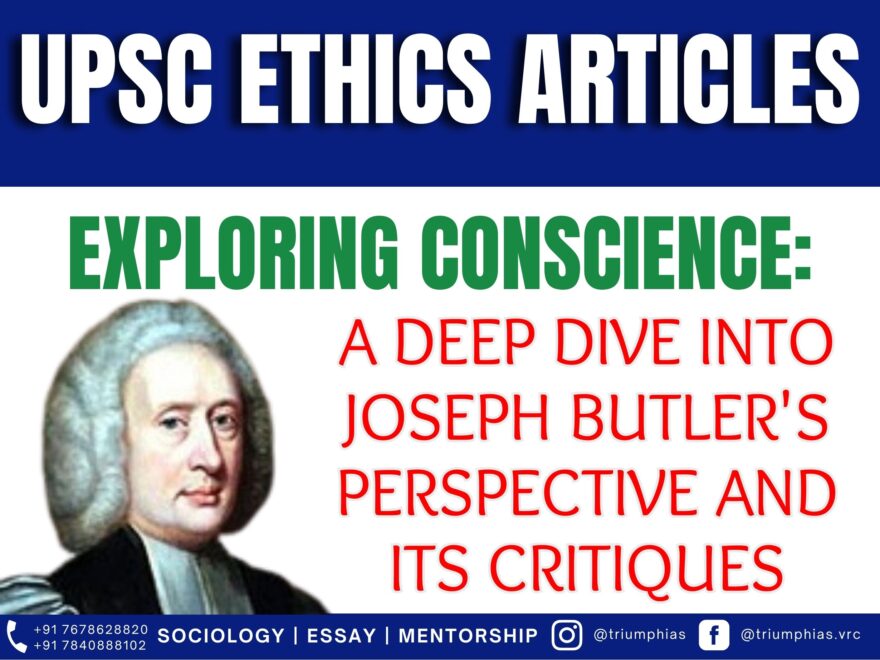Conscience
(Relevant for Ethics, Integrity and Aptitude)

Conscience
Conscience can be described as encompassing two fundamental aspects – an individual’s personal convictions regarding what is morally correct and the process by which one determines what aligns with those convictions. Beyond mere instinct, our conscience serves as a moral compass.
By illuminating our underlying values and guiding principles, it establishes the benchmark against which we assess the ethical nature of our actions. Nevertheless, unlike various other concepts in the realm of social science, conscience eludes operationalization – there exists no method to unveil it or fully comprehend its functioning in practical scenarios.
For instance, attitudes can be scrutinized through methodologies employed in social science research. However, such methods do not apply when studying conscience.
Joseph Butler’s Perspective on Conscience: Joseph Butler stands out as a prominent scholar delving into the concept of conscience. In Butler’s view, conscience represents an innate faculty for reasoning, a ‘natural guide’ endowed by God with ultimate authority. It is intended to serve as the ultimate arbiter for human actions.
Conscience manifests as a reflective principle: it assesses the morality of our past deeds and our intentions. A sense of right and wrong is present in most individuals. According to Butler, this sense is a facet of human reasoning and emotional sentiments.
Conscience as an Individual’s Moral Insight: The essence of conscience closely intertwines with an individual’s capacity for moral insight and autonomy. It signifies the impetus driven by an internal perception of moral correctness and incorrectness, rather than being influenced by external factors such as moral laws, duties, obligations, or virtues. It remains unaffected by the anticipation of rewards or the fear of punishment.
Conscience as a Superior Principle: Conscience operates as a preeminent principle that governs and supersedes specific emotions, passions, and instincts. Human nature comprises distinct components organized in a hierarchical manner. At the apex of this hierarchy resides conscience.
Two Operative Principles of Human Nature:
- Self-love, encompassing the pursuit of personal happiness.
- Benevolence, encompassing the aspiration for the happiness of others.
Conscience arbitrates between these two principles, constituting an integral facet of human nature. This guidance operates on an intuitive level, viewed as a divine bestowal. Consequently, its counsel isn’t discretionary; it carries universal authority in all matters of moral judgment.
Critiques of Butler’s Concepts and the Challenge to the Notion of Conscience:
Numerous objections have arisen against Butler’s propositions, with some criticisms challenging the fundamental notion of conscience itself. These objections encompass various points, such as:
- Conscience lacks true autonomy and distinction as a moral principle. To illustrate, if it’s rational to heed conscience, then the ethical rules established by conscience are either intrinsically rational or they are the directives of an arbitrary authority. In the latter scenario, justifying such arbitrary authority becomes problematic. On the other hand, if the former holds true, conscience lacks a self-contained moral foundation and essentially becomes synonymous with reason.
- The preeminence of conscience lacks clear substantiation. The fallibility of intuition casts doubt on conscience’s infallibility – it can potentially be misguided or erroneous. In the absence of a recourse to external, objective moral benchmarks, Butler’s assertions could potentially pave the way for moral disorder, rather than moral order.
These criticisms underscore the intricate nature of Butler’s ideas, inviting discussions about the role and reliability of conscience as a moral guide.
The appeal to intuitive conscience is self- authenticating or self-certifying. It has its authority from within itself. It is, however, possible to rebut this criticism by pointing out that men are altruistic and benevolent and will not use conscience in support of immoral actions.
Sample Question for UPSC Sociology Optional Paper:
- Question: What is conscience and how does it function as a moral compass?
- Short Answer: Conscience is an individual’s set of personal convictions about what is morally right or wrong. It acts as a moral compass by guiding individuals through moral dilemmas, aiding them in aligning their actions with their core principles.
- Question: Summarize Joseph Butler’s perspective on conscience.
- Short Answer: Butler views conscience as an innate faculty, a ‘natural guide’ endowed by God to serve as the ultimate arbiter of human actions. It arbitrates between self-love and benevolence, the two operative principles of human nature.
- Question: Discuss the criticisms that challenge the notion of conscience as posited by Butler.
- Short Answer: Critics argue that Butler’s concept lacks true autonomy, as ethical rules set by conscience are either rationally or arbitrarily authoritative, making its role questionable. Further, its supposed infallibility is also criticized, as human intuition can often be fallible.
- Question: How does conscience relate to an individual’s capacity for moral insight and autonomy?
- Short Answer: Conscience is closely intertwined with an individual’s moral insight and autonomy, serving as an internal perception of moral correctness and incorrectness, rather than being influenced by external moral laws or duties.
- Question: What are the challenges in operationalizing the concept of conscience in social science research?
- Short Answer: Unlike other social science concepts like attitudes, conscience eludes operationalization due to its innate and deeply personal nature, making it difficult to study through standard social science methodologies.
To master these intricacies and fare well in the Sociology Optional Syllabus, aspiring sociologists might benefit from guidance by the Best Sociology Optional Teacher and participation in the Best Sociology Optional Coaching. These avenues provide comprehensive assistance, ensuring a solid understanding of sociology’s diverse methodologies and techniques.
Best Sociology Optional Teacher, Best Sociology Optional Coaching, Sociology Optional Syllabus, Conscience, Moral Compass, Ethics, Joseph Butler, Moral Insight, Moral Autonomy, Critique, Benevolence, Self-love, Intuition, Authority, Fallibility, Conscience, Moral Compass, Ethics, Joseph Butler, Moral Insight, Moral Autonomy, Critique, Benevolence, Self-love, Intuition, Authority, Fallibility

Choose The Best Sociology Optional Teacher for IAS Preparation?
At the beginning of the journey for Civil Services Examination preparation, many students face a pivotal decision – selecting their optional subject. Questions such as “which optional subject is the best?” and “which optional subject is the most scoring?” frequently come to mind. Choosing the right optional subject, like choosing the best sociology optional teacher, is a subjective yet vital step that requires a thoughtful decision based on facts. A misstep in this crucial decision can indeed prove disastrous.
Ever since the exam pattern was revamped in 2013, the UPSC has eliminated the need for a second optional subject. Now, candidates have to choose only one optional subject for the UPSC Mains, which has two papers of 250 marks each. One of the compelling choices for many has been the sociology optional. However, it’s strongly advised to decide on your optional subject for mains well ahead of time to get sufficient time to complete the syllabus. After all, most students score similarly in General Studies Papers; it’s the score in the optional subject & essay that contributes significantly to the final selection.
“A sound strategy does not rely solely on the popular
Opinion of toppers or famous YouTubers cum teachers.”
It requires understanding one’s ability, interest, and the relevance of the subject, not just for the exam but also for life in general. Hence, when selecting the best sociology teacher, one must consider the usefulness of sociology optional coaching in General Studies, Essay, and Personality Test.
The choice of the optional subject should be based on objective criteria, such as the nature, scope, and size of the syllabus, uniformity and stability in the question pattern, relevance of the syllabic content in daily life in society, and the availability of study material and guidance. For example, choosing the best sociology optional coaching can ensure access to top-quality study materials and experienced teachers. Always remember, the approach of the UPSC optional subject differs from your academic studies of subjects. Therefore, before settling for sociology optional, you need to analyze the syllabus, previous years’ pattern, subject requirements (be it ideal, visionary, numerical, conceptual theoretical), and your comfort level with the subject.
This decision marks a critical point in your UPSC – CSE journey, potentially determining your success in a career in IAS/Civil Services. Therefore, it’s crucial to choose wisely, whether it’s the optional subject or the best sociology optional teacher. Always base your decision on accurate facts, and never let your emotional biases guide your choices. After all, the search for the best sociology optional coaching is about finding the perfect fit for your unique academic needs and aspirations.
To master these intricacies and fare well in the Sociology Optional Syllabus, aspiring sociologists might benefit from guidance by the Best Sociology Optional Teacher and participation in the Best Sociology Optional Coaching. These avenues provide comprehensive assistance, ensuring a solid understanding of sociology’s diverse methodologies and techniques. Sociology, Social theory, Best Sociology Optional Teacher, Best Sociology Optional Coaching, Sociology Optional Syllabus.
Best Sociology Optional Teacher, Sociology Syllabus, Sociology Optional, Sociology Optional Coaching, Best Sociology Optional Coaching, Best Sociology Teacher, Sociology Course, Sociology Teacher, Sociology Foundation, Sociology Foundation Course, Sociology Optional UPSC, Sociology for IAS,
Follow us :


https://t.me/VikashRanjanSociology
Find More Blogs
|
Scope of the subject and comparison with other social sciences |
|||
|
|
|
|
Modernity and social changes in Europe |

